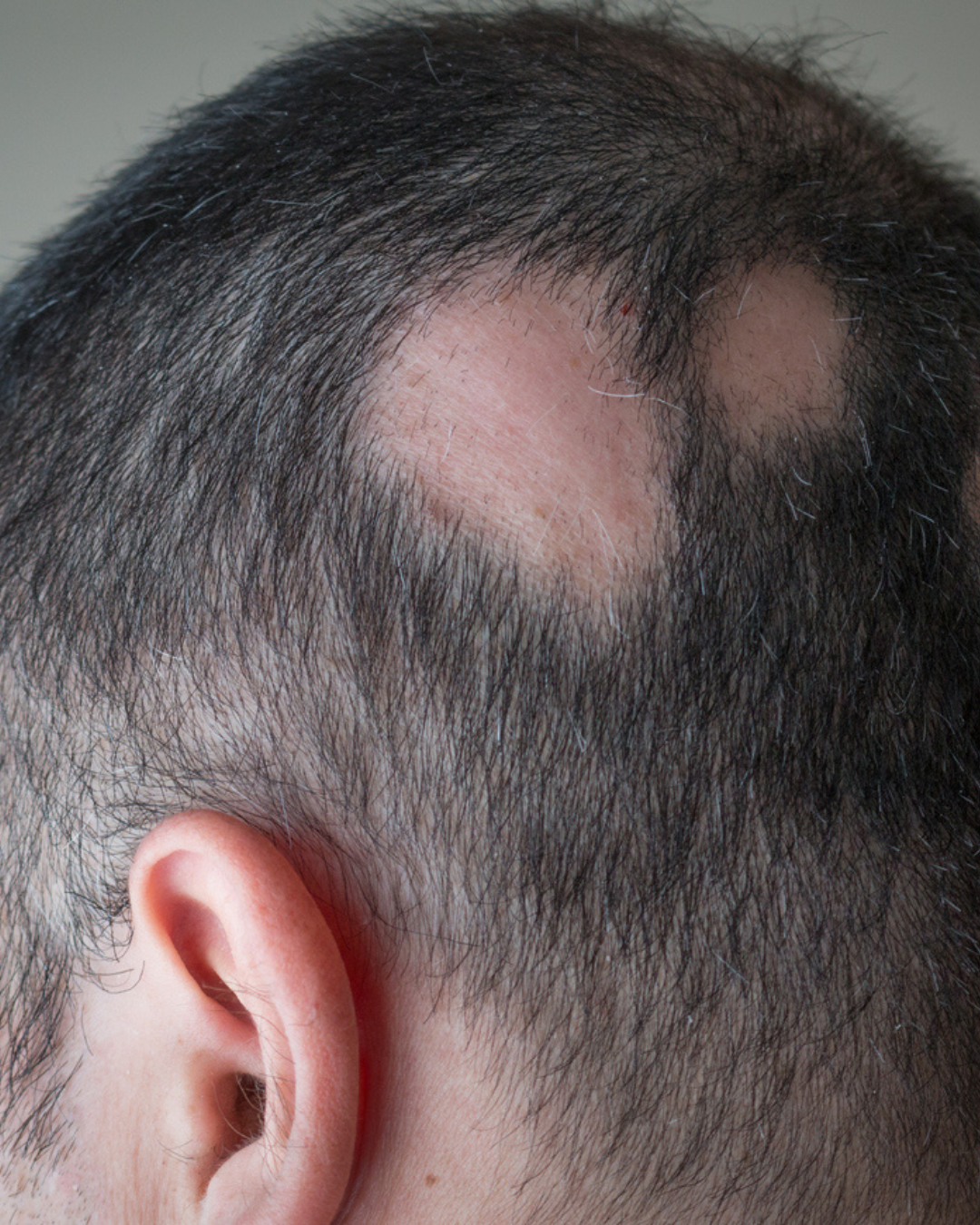
Comprehensive, compassionate, and personalised treatments to support your journey to hair regrowth.
Alopecia Areata is an autoimmune condition that causes patchy hair loss on the scalp, face, and body. It occurs when the immune system mistakenly attacks hair follicles, leading to sudden hair shedding. While it is not life-threatening, Alopecia Areata can have a profound emotional and psychological impact, affecting self-esteem and confidence.
At Southern Dermatology, we understand that hair loss is more than just a cosmetic concern. Our expert dermatologists provide comprehensive assessments and personalised treatment plans to help manage and, in some cases, reverse hair loss and promote regrowth.
Alopecia Areata at a glance
✔ Patchy Alopecia Areata – The most common form, characterised by round or oval bald patches on the scalp or beard.
✔ Alopecia Totalis – Complete loss of hair on the scalp, often progressing from patchy hair loss.
✔ Alopecia Universalis – The most severe form, involving total hair loss on the scalp, eyebrows, eyelashes, and body.
✔ Ophiasis Pattern Alopecia – Hair loss in a band-like pattern around the sides and lower scalp.
✔ Diffuse Alopecia Areata – Generalised thinning of hair across the scalp, rather than distinct bald patches.
✔ Autoimmune Dysfunction – The immune system mistakenly attacks hair follicles, disrupting hair growth.
✔ Genetics – A family history of Alopecia Areata or other autoimmune diseases increases the risk.
✔ Stress & Emotional Trauma – High stress levels can trigger or worsen the condition.
✔ Other Autoimmune Conditions – Conditions like thyroid disease, vitiligo, or type 1 diabetes are linked to Alopecia Areata.
✔ Viral Infections – Some cases develop after illness or viral infections.
✔ Environmental Factors – Exposure to toxins, allergens, or hormonal imbalances may contribute.
✔ Corticosteroids (Topical, Injections, or Oral) – Reduce immune system activity to help stimulate regrowth.
✔ Minoxidil (Topical Treatment) – Encourages hair regrowth in mild to moderate cases.
✔ Immunotherapy (DPCP or Squaric Acid Therapy) – Triggers an immune response to divert the attack away from hair follicles.
✔ Oral JAK Inhibitors – Emerging treatments that block immune signals involved in hair loss.
✔ Platelet-Rich Plasma (PRP) Therapy – Uses growth factors from the patient’s blood to stimulate hair follicle activity.
✔ Light Therapy (Excimer Laser or Phototherapy) – Helps modulate the immune response and promote regrowth.
✔ Wigs & Cosmetic Solutions – High-quality medical wigs and microblading for eyebrows can help improve confidence.
Treatments We offer for Alopecia Areata
Frequently Asked Questions
Alopecia Areata is an autoimmune disorder where the body mistakenly attacks hair follicles, causing hair loss. It is influenced by genetics, immune dysfunction, stress, and environmental factors.
Yes, hair can regrow, especially with early treatment. However, regrowth is unpredictable and varies from person to person.
Alopecia Areata is an unpredictable condition—some people experience temporary hair loss, while others may have long-term or recurring episodes.
Stress can worsen or trigger Alopecia Areata in some individuals, though it is not the sole cause.
Yes, treatments include corticosteroids, immunotherapy, JAK inhibitors, PRP therapy, and laser treatments.
Yes, Alopecia Universalis results in complete hair loss across the scalp, eyebrows, eyelashes, and body.
There is no permanent cure, but advanced treatments can promote regrowth and manage flare-ups.
Small, round bald patches appearing on the scalp or beard are often the first sign.
While a healthy diet and stress management may help overall wellbeing, medical intervention is often necessary for significant regrowth.
PRP Therapy can be beneficial for some patients, as it stimulates growth factors in hair follicles, but results vary.
Yes, some patients experience worsening hair loss, leading to Alopecia Totalis or Universalis.
Some people experience tingling or itching before hair loss occurs, but it is not always present.
Hair regrowth can take weeks to months, depending on treatment response and individual factors.
Emerging treatments like JAK inhibitors and regenerative medicine are showing promising results.
You can fill out our online consultation form, and our dermatologists will assess your condition and recommend a personalised treatment plan.

